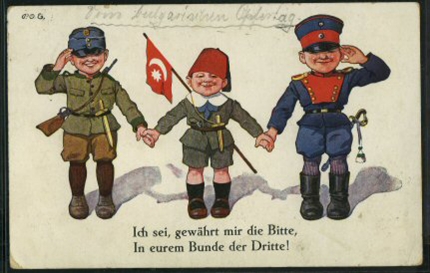By Stavros T.Stavridis
Britain forwarded this seven-page document to the Australian Government possibly in early 1923.[1] The Australians were being primed with important information on a region whose future was still undecided but Britain wanted to keep it for military, strategic, economic and political reasons.
This item provides an excellent historical overview of the British presence in Mesopotamia ( Iraq ) and Persian Gulf from 1900 till 1922. The document titled “ Why did we go to Iraq ?” was prepared by the Middle East Department in the Colonial Office under instructions from the Cabinet Committee on Iraq .
During its deliberations the British Cabinet would have discussed this item on its future policy direction in Iraq and also how this might impact on its relations with Turkey.
It is possible that this document could have been forwarded to the British Foreign Secretary of State 1919-24, Lord Curzon in Lausanne for his information. The Allies-Britain, France and Italy , Greece and Turkey had gathered in Lausanne to establish peace in the Near East. In early September 1922, the Greek army suffered a disastrous military defeat to the Kemalists who entered the city of Smyrna (Izmir) as victors. The Turkish victory showed that Britain had backed the wrong horse during the Greek-Turkish conflict 1919-22.
There are some important six key themes from the document that will be adumbrated below.
Firstly, Lord Lansdowne, the British Foreign Secretary in May 1903 outlined Britain ‘s position in the Persian Gulf. No foreign power would be permitted to establish a naval base along the shores of the Persian Gulf. This policy was mainly aimed at Tsarist Russia who was interested in establishing a warm water port for its naval fleet.[2] The British were also concerned at German economic penetration in Asia Minor along with the creation of the Berlin-to-Baghdad railway with its proposed terminus on the Gulf which posed a serious threat to its economic and strategic interests in the Persian Gulf.[3] Jonathan S.McMurray states that ” the Germans were able to make the Baghdad Railway the cornerstone of the emerging Turco-German cultural partnership.” [4]
Meanwhile the Entente Cordiale between Great Britain and France in 1904 settled their respective differences over Egypt and Morocco as both were concerned with the growing influence of Germany in European and Middle Eastern affairs.[5] However, the Anglo-Russian Entente of 1907, saw these two powers establishing spheres of influence in Persia with Russia controlling the northern part of the country and Britain the southern region. This meant that Britain was able to maintain its control and influence in the Gulf and also resolve its differences with Russia.[6]
Secondly, after the First World War Britain quickly demobilised its huge army of nearly 2 million men but at the same had to garrison the former Ottoman territories of Mesopotamia , Syria , Egypt and Palestine . The cost of maintaining military forces in the Middle East was costing the British taxpayer many millions of pounds.[7] In Mesopotamia , Britain retained Indian troops for garrisoning of Mosul and trained native “levies” who served under British command.[8] The native “levies” included Assyrians, Kurds, Arabs and Turcoman. However, the Assyrians were given a greater role “since most of the operations have been in the Kurdish hills and the Assyrians are experts in mountain warfare.” [9] One issue that requires clarification is that Britain was trying to cut its military expenditures in the Middle East as part of its overall policy of economic retrenchment.[10]
Thirdly, the oil fields of Persia and Mosul are given a lot prominence in this document. Britain understood the importance of controlling the oil fields of the Middle East . In particular :
The Iraq oil-fields have not only not only been developed but have not even been properly prospected. There is no doubt that there are considerable deposits of oil, particularly in the Mosul vilayet, though the exact quantities still remain a matter of surmise….It is possible that, even if Mosul reverted to Turkey, the rights of the British oil interests could be maintained. What is relevant to the present purpose is the desirability of keeping within the British sphere of influence what may prove to be one of the most important oil-fields of the future.[11]
The oilfields and control of Mosul were vital for Britain’s strategic interests in the Middle East.
Fourth, Britain was interested in establishing friendly relations with the Kemalists but the issue of Mosul complicated matters between them during the Lausanne Conference 1922-23. Britain may have been concerned by a Turkish invasion of northern Iraq . The Turks were in no position to launch such an offensive, as nearly 10 years of continuous warfare had economically and militarily exhausted them. They could have encouraged the Kurdish and Arab irregulars to foment problems for the British around Mosul.[12]
Fifth, Emir Feisal’s appointment as King would serve British interests in Iraq . As monarch the British considered him a symbol in uniting the different racial groups -Arabs (Shi’ites and Sunnis), Kurds, Assyrians, Yezidis and Turkmen – behind the Iraqi throne. The Anglo-Iraq Treaty of October 1922 gave legitimacy to Feisal’s position as sovereign with exchange friendly letters with the British monarch. He also commanded the nascent Iraqi army.[13]
Finally Britain believed it had an obligation to assist the Assyrians who loyally assisted the Allies during the 1914-18 war. Many surviving Assyrians ended up in the Baqubah refugee camp where the British provided them with food, clothing and shelter. This camp was closed in 1921 and many Assyrians were moved to the Mosul Province.[14] During the Lausanne Conference, the British raised the issue of resettling Assyrians in the Hakkari region of Eastern Turkey but the Turks refused the British suggestion.[15]
Appendix A
[1] see footnote no.8 for full citation. This document will be reproduced in full at the end of this article as Appendix A
[2] Lord Lansdowne declaration to the House of Lords debate, May 5, 1903 Series 4 Vol.121, cols.1344-48 in https://api.parliament.uk/historic-hansard/lords/1903/may/05/great-britain-and-the-persian-gulf (accessed July 17, 2018); ‘Editorial’ & ‘Parliament’, Manchester Guardian, May 6, 1903, p.4 & 5; ‘British Policy in the Persian Gulf’, Manchester Guardian, May 7, 1903 , p.3;’Britain issues a warning as to the Persian Gulf’ & ‘England’s Monroe Doctrine’, New York Times, May 7 & 8, 1903, pp.3 &8
[3] WO Henderson, Studies in German Colonial Policy, Frank Cass & Co, Abingdon & New York, 1962, 2nd Ed 1976, Digital Printing, pp.78-9; Diem Ekici,’Orientalism, Expressionism, Imperialism,’ in Lee Roberts (Ed), Germany and the Imagined East, Cambridge Scholars Press, Newcastle, UK, 2005, pp.96-7; Donald M.McKale, War by Revolution: Germany and Great Britain in the Middle East and in the ear of World War 1, Kent State University Press, Kent, Ohio, 1998, pp.14-5;Philip Willard Ireland, Iraq, Routledge, London & New York, 3rd Ed 2009 (originally published 2004), pp.50-2
[4] Jonathan S.McMurray, Distant Ties. Germany, the Ottoman Empire, and the construction of the Baghdad Railway, Praeger Publishers, Westport, CT, 2001, p.14; For a discussion of Germany’s growing influence in the Ottoman Empire before the outbreak of WW1 including the Berlin-Baghdad railway project, see Sean McMeekin, The Berlin-Baghdad Express, Penguin Books, London, 2010; Murat Ozyuksel, The Berlin-Baghdad Railway and the Ottoman Empire, I.B.Tauris, London & New York, 2016; Naci Yorulmaz, Arming the Sultan, I.B.Tauris, London & New York, 2014
[5] J.C Hurewitz, Diplomacy in the Near and Middle East A Documentary Record 1535-1914 Vol.1, D Van Nostrand Co, Princeton, New Jersey, 1956, pp.263-65; The interested reader might wish to consult the following works on the establishment of the Entente Cordiale, see C.Andrew, Theophile Déclassé and the making of the Entente Cordiale, Palgrave Macmillan, London, 1968, chs.9-10 & 12-13; P.J.V Rolo, Entente Cordiale, Macmillan/St Martin’s Press, London, 1969
[6] For a discussion on the diplomatic discussions between Great Britain and Russia which led to the Anglo-Russian Convention of 1907, see G.P Gooch & Harold Temperley, British Documents in the origin of the war 1898-1914: Vol.4 The Anglo-Russian Rapprochement 1903-1907, HMSO, London, 1929, pp.389-511, 578-617 & 618-21; BJ Williams, The Strategic background to the Anglo-Russian Entente of August 1907, Historical Journal, Vol.9, issue.3, 199, pp.360-73
[7] Robert C.Self (Ed), The Austen Chamberlain Diary Letters, Press Syndicate of the University of Cambridge, Cambridge, 1995, pp.108,111 &117; Keith Jeffery, The British Army and the crisis of empire 1918-22, Manchester University Press, Manchester UK, 1984, pp.18-9
[8] House of Commons, Parliamentary Paper Cmd.1061, Review of the Civil Administration of Mesopotamia, HMSO, London, 1920, chs.1-5; ‘Mesopotamia Mandate’, The Times of India, May 29, 1920, p.22;
‘Commons debate on Mesopotamia’, Manchester Guardian, June 24, 1920, p.9
[9] National Archives of United Kingdom, Colonial Office, CO 935/1, Report of the High Commissioner on the development of Iraq 1920-25, Colonial Office, 1926, p.32
[10] House of Commons, Parliamentary Paper Cmd.1061, Review of the Civil Administration of Mesopotamia, HMSO, London, 1920, chs.1-5; ‘Mesopotamia Mandate’, The Times of India, May 29, 1920, p.22;
‘Commons debate on Mesopotamia’, Manchester Guardian, June 24, 1920, p.9
[11] National Archives of Australia , Canberra ACT Series A981/4 item IRA 15 part 1 Iraq-Mosul dispute British policy and interests, Mosul question, etc 1922-1923, Committee on Iraq. I.R.Q.3, Middle East Department, Colonial Office, December 11, 1922, p.4; The same document can also be found in National Archives of the United Kingdom, Cab 27/206
[12] Turkey No.1 Cmd.1814 Lausanne Conference on Near Eastern Affairs 1922-23, HMSO, London, pp.337-405; Sevtap Demirci, Turco-British manouvres on the Mosul question in the Lausanne Conference 1922-23, British Journal of Middle Eastern Studies, Vol.37, no.1 (April 20100, pp.57-71; Othman Ali, The Kurds and Lausanne Peace Negotiations 1922-23, Middle Eastern Studies, Vol.33 no.3 (July 1997), pp.521034
[13] House of Commons, Parliamentary Paper Cmd.1757, Iraq.Treaty with King Feisal signed October 10, 1922, ,signed in Baghdad, HMSO, London, 1922; National Archives of Australia , Canberra ACT Series A981/4 item IRA 15 part 1 Iraq-Mosul dispute British policy and interests, Mosul question, etc 1922-1923, Committee on Iraq. I.R.Q.3, Middle East Department, Colonial Office, December 11, 1922, p.6; ‘The Iraq Treaty’, The Times of India, October 31, 1922, p.11
[14] Great Britain, Cabinet Office, Cab 24 series, Cab24/114,CP 2073.The Assyrian and Armenian refugees in Mesopotamia, ES Montagu, November 4, 1920; Cab 24/114, CP 2082.Refugees in Mesopotamia, Winston S.Churchill, November 9, 1920; Cab24.115 CP 2101. Refugees in Mesopotamia, ES Montagu, November 16, 1920
[15] John Joseph, The modern Assyrians of the Middle East, Brill, Leiden, Netherlands, 2000, pp.167-8




